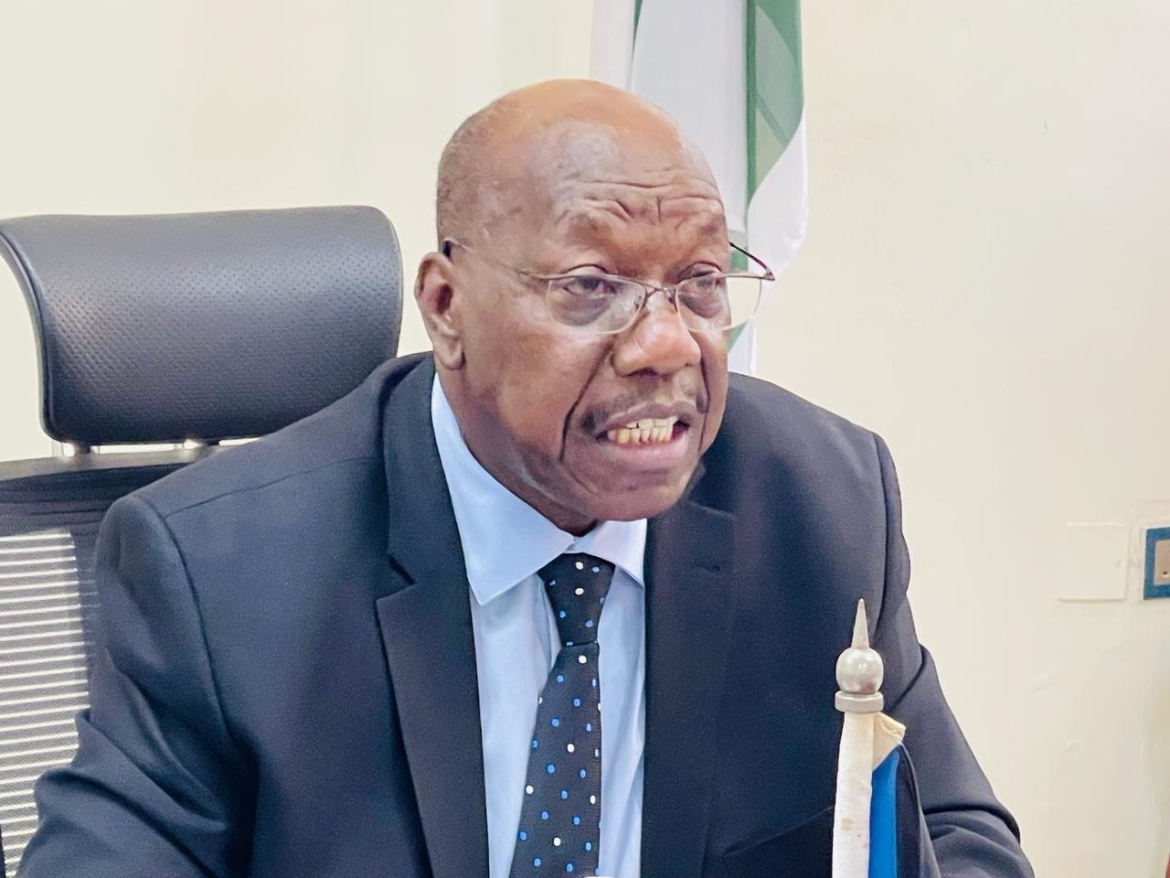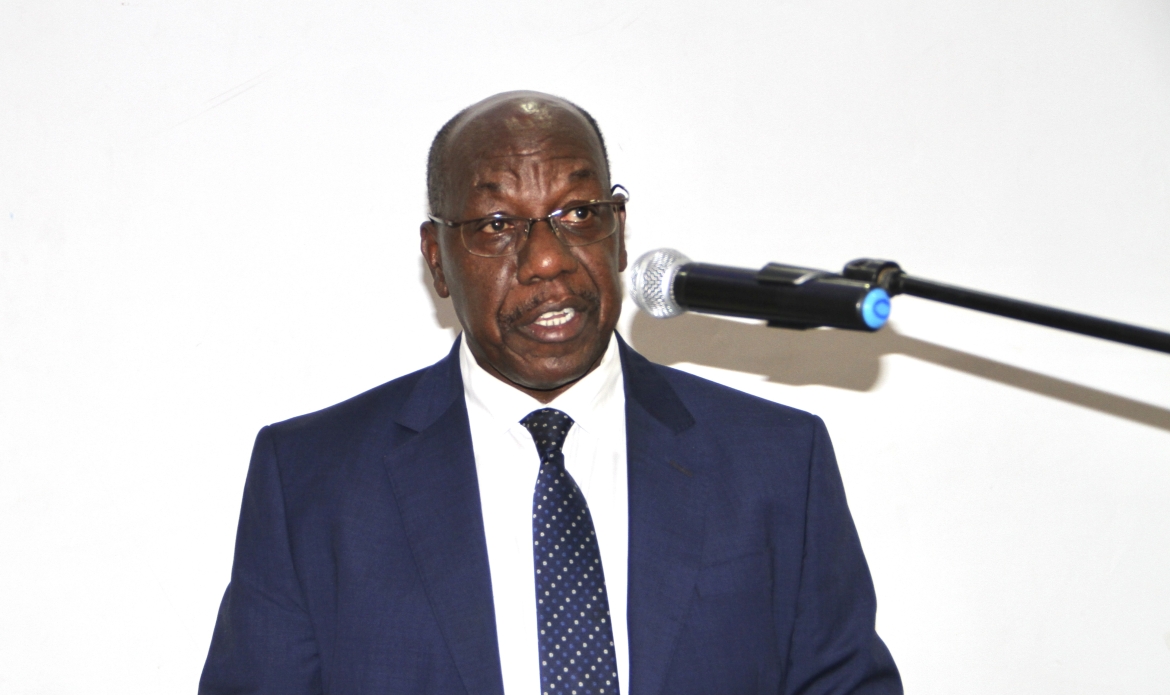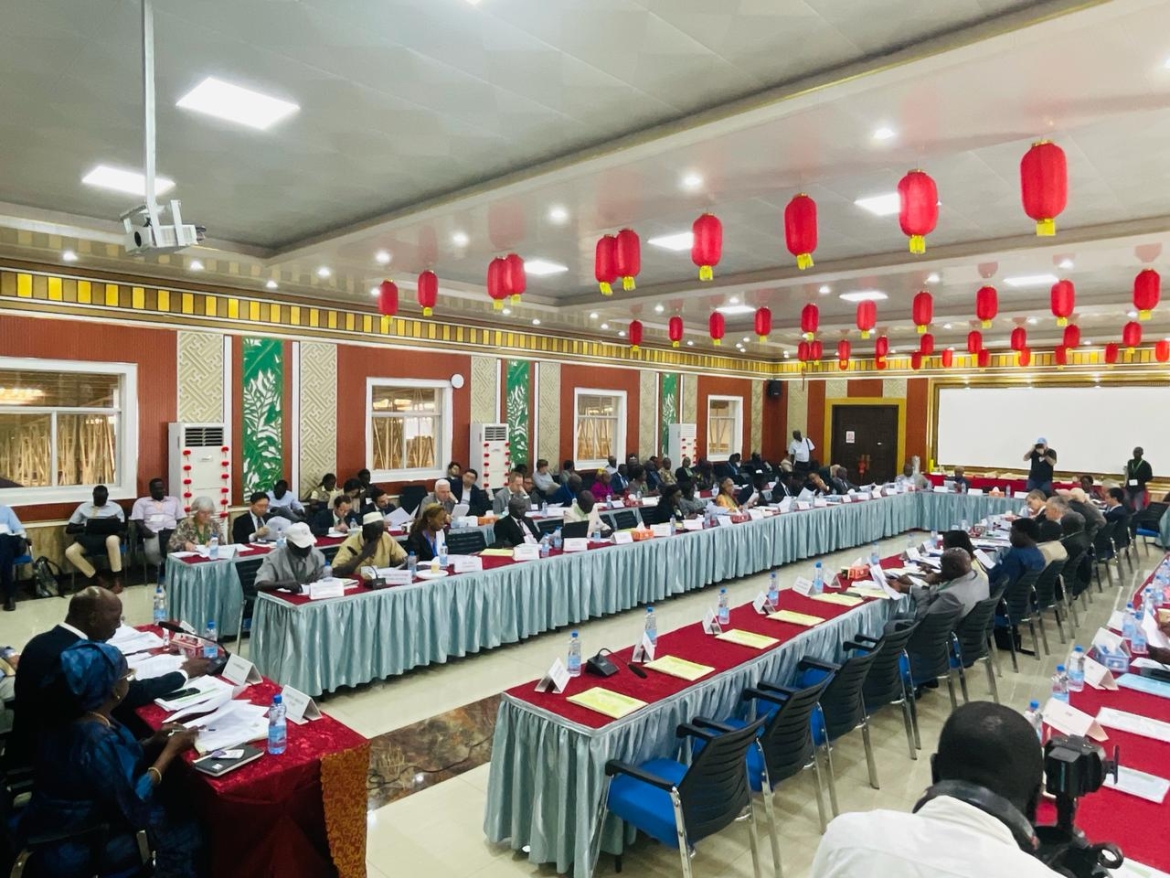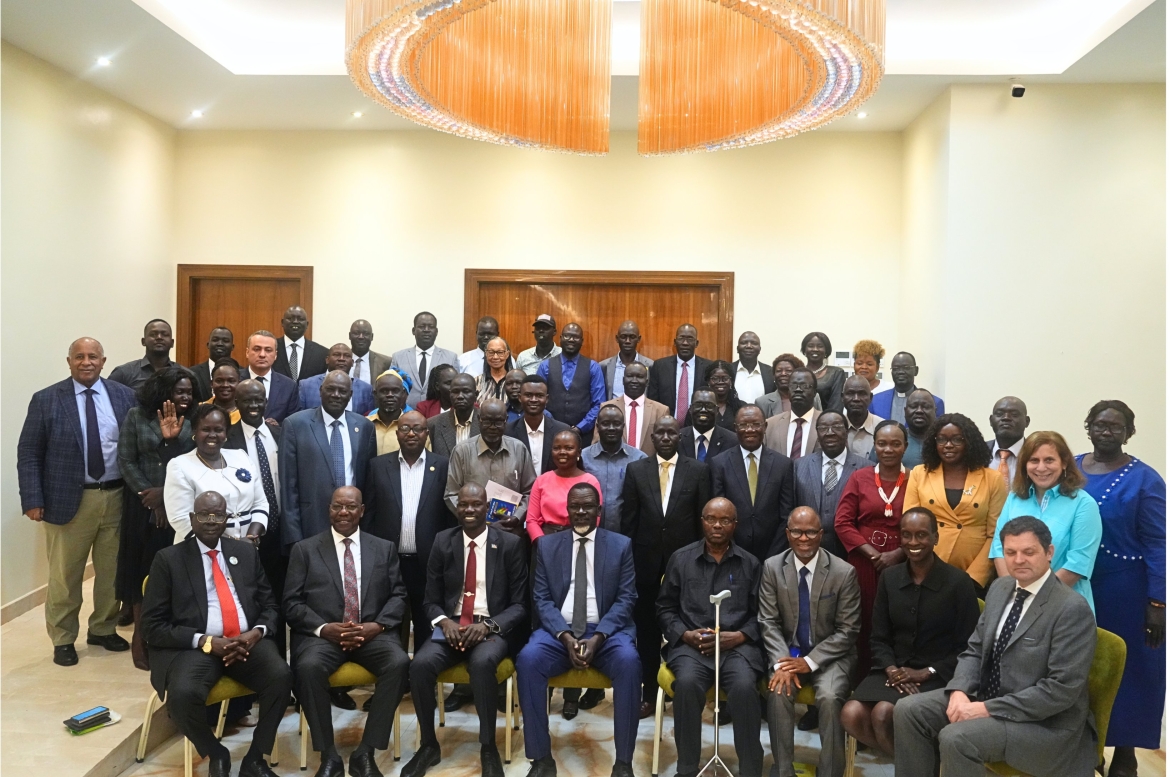As the end of the pre-transitional period draws near on May 12, 2019, critical tasks in the implementation of the revitalized Agreement remain pending, the Reconstituted Joint Monitoring and Evaluation Commission (RJMEC) has said.
Speaking during the 5th RJMEC plenary in Juba on Friday, Interim Chairperson Ambassador Lt. Gen. Augostino Njoroge said,
“Critical pending tasks include activities towards the unification of forces, which involve the process of cantonment and training, and the determination on the number and boundaries of States, and the composition and restructuring of the Council of States.”
He said “it is clear that achievements have fallen way short of what was intended for the Pre-Transitional Period.”
Additionally, Ambassador Njoroge expressed concern over continued denial of access faced by CTSAMVM’s Monitoring and Verification Teams (MVTs) in the country.
RJMEC said, “During the first quarter of this year, the number of access denials the MVTs encountered totaled to 31. Despite the resolutions of the RJMEC, it is disappointing to note that this is a persistent problem.”
“I call on the commanders in Juba to hold their field commanders to account and allow free and unfettered access,” he said.
He noted “with dismay” that findings of investigations into the November 2018 incidents of sexual and gender-based violence in Bentiu have not been made public, nor has RJMEC been given the full report of the government’s investigation and action on the Luri incident.
On the humanitarian front Ambassador Njoroge said “A critical issue to be addressed by the Political leaders of South Sudan is the living conditions of the almost 4 million refugees and internally displaced who are living in very difficult circumstances.”
“These South Sudanese citizens are eagerly waiting for the security conditions to improve so as to return to their homes. Their confidence and trust will be enhanced by the commitment of political leaders to significantly improve the security environment for their voluntary and dignified return, hopefully for a better future,” he said.
The National Constitutional Amendment Committed (NCAC) has on Wednesday convened stakeholder’s workshop aimed at validating proposed amendments to the South Sudan Political Parties Act, 2012 as well as obtain views and recommendations to support the amendment process.
The National Constitutional Amendment Committee (NCAC) has today handed over five (5) security Bills to the Minister of Justice and Constitutional Affairs, Hon. Paulino Wanawila.
A team led the Reconstituted Joint Monitoring and Evaluation Commission (RJMEC) led by Interim Chair H.E Amb. Lt. Gen. Augostino Njoroge has on Monday held a meeting with South Sudan President H.E Salva Kiir Mayardit.
Progress, challenges and prospects of the implementation of the revitalized agreement were discussed.
Ambassador said “There is need for an urgent meeting of the Parties at the highest political level to discuss the status of the implementation of the R-ARCSS so as to come up with an agreed roadmap on the best way forward.”
In order to continue to galvanize support from the Regional Guarantors and prepare for the Transitional Period, the Ambassador noted, there is need to “lobby the Chairperson of the IGAD Summit so that an urgent IGAD Council of Ministers meeting and Summit on South Sudan be convened in Juba.
The acting Chairperson of the Reconstituted Joint Monitoring and Evaluation Commission (RJMEC) Ambassador Lt. Gen. Amb. Augostino Njoroge has on Monday held a meeting with South Sudan Chief of Staff, General Gabriel Jok Riak. During the meeting, the two discussed the status of implementation of the revitalised Agreement and the time of the end of the Pre-Transitional period.
General Riak is also the chairperson of the Joint Defence Board (JDB).
"The Reconstituted JMEC welcomes the work of the JDB in beginning the process of cantonment and traning of unified forces. This is critical during this phase of the Pre-Transitional Period," said Amb. Njoroge.
Ambassador was accompanied by JMEC Chief of Staff Amb. Berhanu Kebede and his deputy for Strategy Dr. Thomson Fontaine.
The National Constitutional Amendment Committee (NCAC) has on Tuesday received submissions from representatives of twelve national political parties towards the amendment of the constitution of the Republic of South Sudan.
The committee led by Chairperson, Mr. Gichira Kibara received the written submission in the capital Juba. Mr. Kibara said the submissions will be taken into account during the ongoing deliberation by the Committee on the South Sudan Political Parties Act, 2012.
The political parties were the African National Congress, the Sudan People’s Liberation Movement (SPLM), United South Sudan African Party (USSAP), United Democratic Salvation Front-Mainstream (UDSF-M), National Liberation Party (NLP) and National Congress Party (NCP).
Others were Democratic Change Party (DCP), South Sudan Democratic Forum (SSDF), National United Democratic Front (NUDF), United South Sudan Party, South Sudan Democratic Alliance (SSDA) and Sudan African National Union (SANU).
The Reconstituted Joint Monitoring and Evaluation Commission (RJMEC) has on Tuesday convened in Juba an extraordinary meeting to discuss funding and other challenges facing the implementation of the revitalized Agreement during the pre-transitional period.
The Reconstituted Joint Monitoring and Evaluation Commission (RJMEC) will tomorrow, convene an extraordinary meeting, as per the request of the 3rd Plenary of the RJMEC, held on January 23rd, 2019, in Juba.
Media practitioners must diligently work towards a free, impartial and responsible media industry, which “focuses on truth and fosters peace” in South Sudan, the Reconstituted Joint Monitoring and Evaluation Commission (RJMEC) has said.
Speaking at a forum convened in Juba to mark this year’s World Radio Day on Wednesday, RJMEC Chief of Staff Ambassador Berhanu Kebede said the media should “fully realize the objective of ensuring sustainable peace as well as economic growth and development in South Sudan.”
The forum, themed “Dialogue, Tolerance and Peace”, brought together representatives of radio stations and journalists in the country. The day is marked annually on 13 February.
“Among the major media outlets, radio has an important role to play in promoting confidence and peace building because of its wide reach and the diverse languages that programming is broadcast in,” Ambassador Kebede said.
“Radio as a medium provides a wider platform for people to solve problems and challenges that affect their livelihood. Discussions conducted in this manner provide a sense of belonging, dignity, and achievement,” he added.
Ambassador Kebede urged members of the media to be a “pillar in the process of building sustainable peace” by “increasing knowledge and awareness of public affairs, and in particular, the peace process.”
“By creating and broadcasting peace-themed radio programming, radio stations are able to ensure that as many members of the community as possible can contribute to the discussion,” he said.
Regarding the implementation of Agreement, the Chief of Staff said there has been willingness among the Parties to engage in dialogue, who have shown commitment to implement the Revitalized Peace Agreement.
“We must work together to ensure that confidence and peace building efforts bear more fruit and that the people of South Sudan feel part of the process.”
Establishment of numbers, training sites and start dates of cantonment remains an essential step towards the effective unification of South Sudan security forces, the Reconstituted Joint Monitoring and Evaluation Commission (RJMEC) has said.
“Declaring the numbers, locations and start dates of cantonment and training sites (for forces) is essential to be able to move forward to the next decisive phase of unification of forces," said RJMEC Interim Chairperson Ambassador Lt. Gen. Augostino Njoroge said during the official closing ceremony of a two-day workshop on Friday in Juba.
The workshop was convened on Thursday by RJMEC, and was attended by chairpersons and members of all the security mechanisms responsible for the implementation of the Permanent Ceasefire and Transitional Security Arrangements of the Revitalized peace Agreement.
The mechanisms established under Chapter II of the Agreement are the Joint Defence Board, the Joint Military Ceasefire Commission, the Joint Transitional Security Committee and the Strategic Defence and Security Review Board.
“The issue of training will become critical when unifying and sustaining the national South Sudanese defence and security forces. The Joint Transitional Security Committee (JTSC) should therefore develop rigorous criteria for training,” Lt Gen Njoroge continued.
Yours is sensitive work, Ambassador Njoroge told members of the security mechanisms, “but vital aspects such as trust, truthfulness, and clarity of objectives were all debated (at the workshop) in a collegiate and professional manner.”
“I expect that your work will continue in this constructive way. The gaps and challenges that are common in tasks such as yours will be more easily overcome through discipline and continued cooperation.”
The Interim Chairperson of the Reconstituted Joint Monitoring and Evaluation Commission (RJMEC) Ambassador Lt. Gen. Augostino Njoroge has advised military generals in S. Sudan to desist from engaging in politics, and instead serve citizens professionally.
“I want to address you as soldiers. In my experience as a soldier, I have learned that soldiers should leave politics to politicians. I therefore, expect you as soldiers to perform your duties in a professional manner, and uninfluenced by politics,” he noted.
Ambassador Njoroge added, “Key to your demonstration of professionalism is to provide accurate facts and figures. Only the truth will enable you to develop a clear strategy and realistic plans that will enable you to accomplish your mission.”
He was addressing Chairpersons and members of all the security mechanisms responsible for the implementation of the Permanent Ceasefire and Transitional Security Arrangements of the Revitalized peace Agreement. The two-day orientation and coordination workshop got underway today in Juba, and is convened by the RJMEC.
“It is also vital to your success that you develop trust amongst yourselves, the soldiers you command and the people you serve,” he said.
The mechanisms are the Joint Defence Board (JDB), Joint Military Ceasefire Commission (JMCC), Joint Transitional Security Committee (JTSC) and the Strategic Defence and Security Review Board (SDSR-B).
The workshop is aimed at creating a common understanding of the provisions of the Agreement, develop modalities for coordination among all security mechanisms and identify challenges hampering the execution of their mandate.
“I am fully aware that the permanent ceasefire is largely holding, thanks to the efforts of all of you,” he said.





